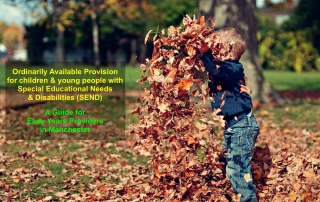“Ordinarily Available Provision” (OAP) describes the support, strategies and activities that are available to children and young people with additional needs, regardless of formal diagnosis or commissioned specialist support – what is available as part of the basic good practice in school or in an Early Years (EY) setting. Teachers, EY practitioners, and senior leaders are expected to use this document to support children with emerging and additional needs in their school or setting.
There currently are two Ordinarily Available Provision documents in Manchester, which you can access through the links below:
* Early Years OAP
* Primary OAP
You can also read about SEN Support on Manchester City Council’s website. This refers to help that is additional to or different from the support generally given to other children of the same age.
Below are some articles and events relating to Ordinarily Available Provision in Manchester:



